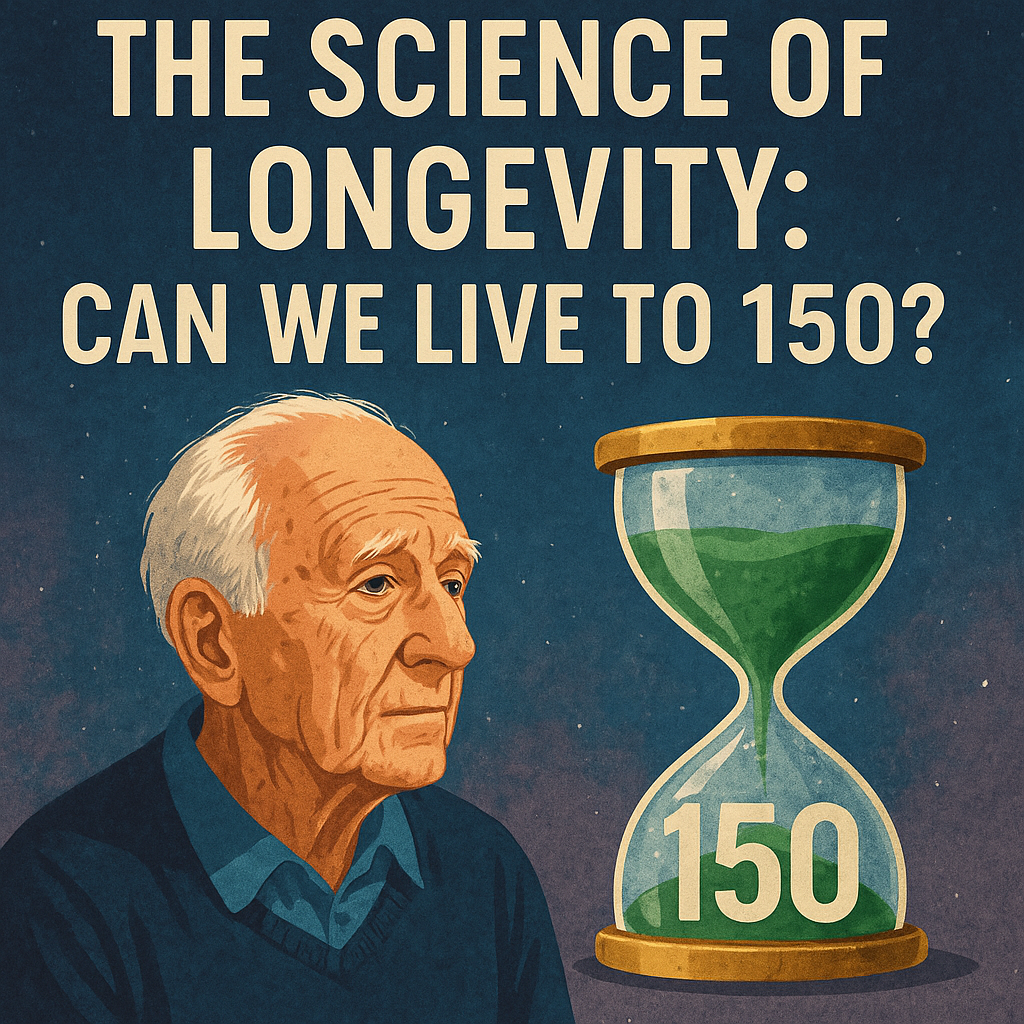What if 100 was just the halfway point?
For most of human history, living to old age was rare. Today, it’s becoming normal. But some scientists, futurists, and biohackers believe we’re only scratching the surface of our potential lifespan. They’re asking: Can we live to 150? Or even beyond?
The race to extend life is no longer confined to science fiction. It’s happening right now — in labs, startups, and clinical trials around the world. Let’s explore what modern science says about extreme longevity, the biological limits of aging, and the possibility of radically extending human life.
Breaking the Age Barrier: Why 150?

Why 150? It’s not just a random number.
In 2021, a groundbreaking study published in Nature Communications analyzed data from over 500,000 people to estimate the absolute limit of human life. Their findings suggest that while most people won’t reach it, the theoretical biological ceiling for human life could be around 120 to 150 years.
This doesn’t mean someone will live that long tomorrow — but it does challenge the long-standing assumption that we’re capped at around 100. Scientists believe that if we can better understand and control the rate of biological aging, then extending life to 150 could become reality for future generations.
What Is Aging — and Can It Be Reversed?

Aging is not just about wrinkles and gray hair. At its core, aging is a biological process: cells divide, accumulate damage, and lose function over time. Eventually, the body breaks down.
But here’s where it gets interesting — scientists are discovering that aging is not a one-way street. In fact, some aspects of aging can be slowed, stopped, or even reversed.
Here are a few of the most promising approaches:
1. Cellular Reprogramming
This is the big one.
Cellular reprogramming involves turning back the biological clock on individual cells. In 2006, scientist Shinya Yamanaka discovered how to take adult cells and reset them to a youthful, stem-cell-like state using four genes — now called “Yamanaka factors.”
Recent animal studies have shown that partial reprogramming can reverse signs of aging in mice, restoring organ function and even improving lifespan.
Companies like Altos Labs (funded by Jeff Bezos and other billionaires) are investing heavily in this research — betting that reprogramming can one day rejuvenate human tissues and organs.
2. Senolytics: Killing Zombie Cells
As we age, some cells enter a “senescent” state — they don’t die, but they also don’t function properly. They become zombie cells, releasing toxic compounds that accelerate aging and disease.
Senolytics are drugs designed to remove these senescent cells from the body.
Early trials in animals show promise — clearing these cells can improve physical function, reduce inflammation, and even extend lifespan. Human trials are currently underway.
3. NAD+ Boosters and Mitochondrial Repair
NAD+ is a molecule that helps cells produce energy and repair DNA. Levels of NAD+ decline with age, contributing to fatigue, cognitive decline, and disease.
Supplements like NMN (nicotinamide mononucleotide) and NR (nicotinamide riboside) are being studied for their ability to raise NAD+ levels and rejuvenate the body’s energy systems.
Some researchers believe these compounds may eventually become part of a daily longevity routine — like vitamins for aging.
4. Genetic Editing and CRISPR
Gene-editing tools like CRISPR-Cas9 may allow us to correct aging-related mutations at the DNA level. While we’re still in early stages, targeted gene therapy is already being tested to fight diseases like muscular dystrophy and inherited blindness.
Eventually, it could be used to prevent the root causes of aging itself.
The Longevity Lifestyle: What We Can Do Now
While many of these breakthroughs are still being developed, some longevity habits are already backed by strong science. If you want to live a longer, healthier life — and maybe reach that 150 mark — start here:
- Fasting and Caloric Restriction: Intermittent fasting and calorie control trigger autophagy — the body’s cellular cleanup process.
- Sleep and Stress Management: Chronic stress and poor sleep accelerate aging at the cellular level.
- Exercise: Especially resistance training and cardio, which maintain muscle, bone density, and brain health.
- Plant-Rich Diets: Anti-inflammatory diets rich in polyphenols and fiber have been shown to support longevity.
- Strong Relationships: Social connection is one of the most powerful predictors of long life.
These are small steps — but they add up over decades.
The Ethics and Philosophy of Living to 150
Living longer raises some deep questions.
What would society look like if people routinely lived to 150? Would we delay marriage, careers, or retirement? How would pensions and healthcare systems adapt? Would we face more overpopulation or fewer new ideas?
And then there’s the personal side: Do we want to live that long?
Some people fear a life of extended old age and decline. But longevity science isn’t just about lifespan — it’s about healthspan: staying mentally sharp, physically capable, and full of energy well into your later decades.
The real promise isn’t just more years — it’s more vibrant, meaningful years.
From Biohacking to Billionaire Longevity Labs
This field is attracting huge investment.

Silicon Valley entrepreneurs and billionaires — from Peter Thiel to Elon Musk’s circle — are pouring money into startups focused on age reversal, regenerative medicine, and digital immortality.
Companies like:
- Calico (backed by Google)
- Altos Labs
- Life Biosciences
- Juvenescence
- Blueprint (known for Bryan Johnson’s age-reversal protocol)
Many of them believe the first person to live to 150 may already be alive — or even reading this blog.
Final Thoughts: Is 150 a Dream or Destiny?
We don’t yet have the full roadmap to 150. But what was once unthinkable is now a serious scientific pursuit. While we may not all make it to that number, the science of longevity is already reshaping how we think about aging, health, and the future of humanity.
The goal is not to live forever.
The goal is to live better, longer — with clarity, strength, and purpose.
And maybe, just maybe, blow past 100 with a cake that says: “Halfway there.

